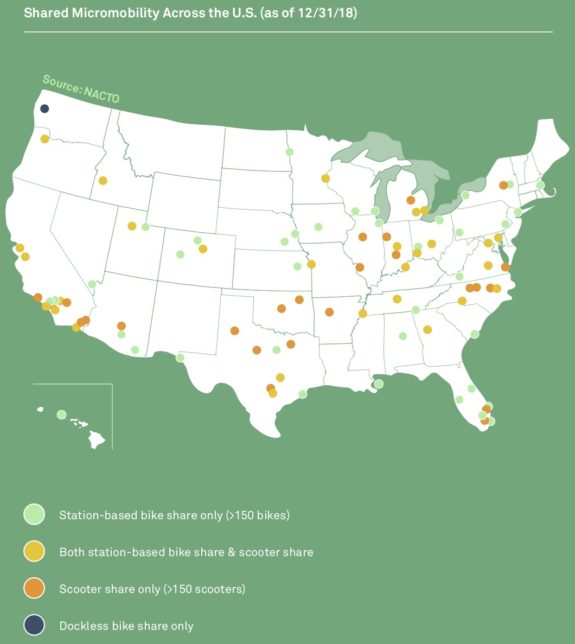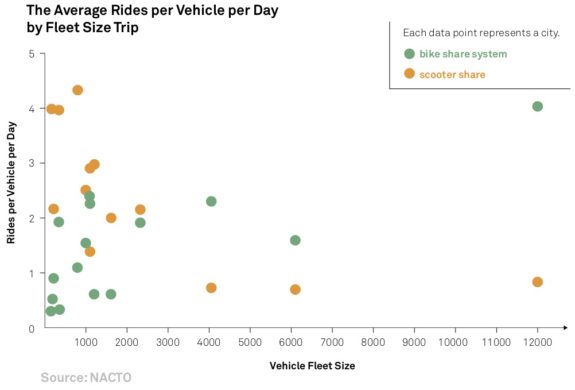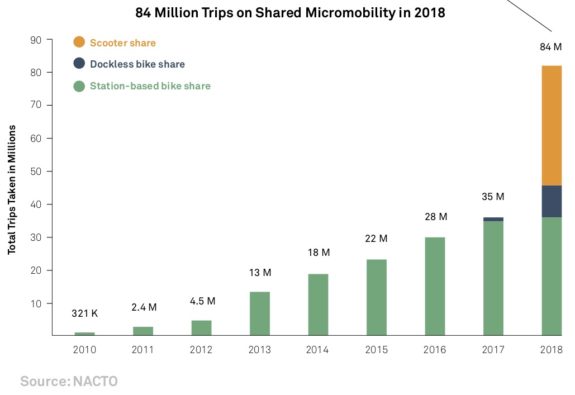
Just 21 months ago, Seattle turned American bike share on its head by permitting companies to launch free-floating bikes all over town, an effort that dramatically increased the number of bike trips all over town, turned heads in city halls across the country and helped demonstrate the popularity of so-called “micromobilty” companies, some of which are now valued in the billions of dollars.
Since Spin and Lime (née LimeBike) launched in summer 2017 the industry has pivoted and changed many times over:
- It started with pedal bikes from U.S.-based companies.
- Then Beijing-based ofo arrived, charging only $1 per hour.
- Then electric scooters arrived in other cities, with per-minute fees.
- Then electric bikes arrived alongside pedal bikes, also with per-minute fees.
- Then Uber bought JUMP and Lyft bought Motivate.
- Then Lime added car share to its bike and scooter fleets.
- Then ofo imploded.
- Then pedal bikes were completely replaced by electric bikes and scooters.
- Now, in most cities, bikes are disappearing altogether because scooters get so many more uses per day than bikes.
But Seattle is a notable exception to this final trend, due mostly to Mayor Jenny Durkan’s continued resistance to allowing scooters. An early free-floating bike success story, Lime and JUMP are still working to compete here for the bike share market. Lyft is supposed to join the fray at some point, too, though there has been little news about their efforts.
And according to a recent report by the National Association of City Transportation Officials (“NACTO”), of which Seattle is a member, Seattle now stands out as an oddball in the country, and report authors essentially had to create a separate category just for Seattle. While other cities have sort of stratified into scooter cities and cities with dock-based bike share, Seattle is the only city noted as having only dockless bikes. At this point, Seattle is home to a huge percentage of all trips taken on dockless bikes in the country.
The report notes that 84 million trips have been taken on “shared micromobility” services in the nation, with the bulk split between the small handful of large docked systems and new scooter services:
The report also confirms something Seattle’s Pronto Cycle Share learned the hard way: The worst-performing systems are dock-based bike share systems that do not have enough bikes and stations. But large dock-based systems, especially New York’s Citibike, continue to grow. And in cities that don’t have large, established docked bike share systems (so, most cities), scooters boomed in 2018.

Though this blog has been critical of the mayor’s stance on scooters in the past, I wonder if this will turn out to be a good thing (though not because scooters are too dangerous as she has suggested). We still have great bike share service today while other cities are losing bikes to scooters, a mobility tool that is popular but still unproven as a longterm success.
I was initially excited to hear about the popularity of scooters, and I liked the idea of them existing alongside bikes as part of an array of options people can choose from to get around without a car. But I must admit that the shift away from bikes at Lime, Spin and several other companies strikes me as possibly short-sighted. I get that these are for-profit companies, so focusing on more profitable scooters makes immediate business sense. But bikes have been around longer than cars, and they are a tried and true vehicle for getting around cities. The shared scooters might remain more popular than bikes, or they might be a fad. We just don’t know yet. Bikes don’t have the added appeal of being novel, but they definitely are not a fad.
Personally, I feel much more secure on a bike share bike than a scooter, but that is most likely just my personal preference as someone who is used to biking everywhere. Use in other cities suggests more people prefer the scooters.
While I would love to see Seattle add scooters as an option, I am happy that Seattle still has bike share. After Pronto’s demise, there is likely very little political will to invest public funding in a Citibike-scale docked bike system. So if the choice is bikes or scooters (rather than both), then I’d rather Seattle have bikes and remain the exception to the national trends. If nothing else, it seems potentially valuable to these companies to have Seattle’s bikes as a hedge on their bigger scooter bet. Continue experimenting here, trying to see how to grow bike share use. I’m certain the 2018 hard pivot to scooters is not the last pivot we’ll see from this industry.









Comments
18 responses to “Seattle’s bike share stands out as companies shift to scooters elsewhere”
Is there any aspect of combustion-free transportation that Mayor Durkin supports?
Stall the Streetcar, reject bike lanes, reject scooters.
Oh, Cary Moon… What might have been…
I think Durkan does support electric cars. But, that might the the only one.
I’ve ridden both Lime scooters (in other cities) and bikes, and having done both, I think I get what Lime’s doing and why the private bike/scooter ecosystem has evolved to this state.
Compared to the Lime bikes I’ve ridden, the scooters are always in much better condition than the bikes, which I chalk up to scooters having fewer moving parts than any bike. The few moving parts they do have are smaller, simpler, tougher and better tucked away from vandalism and senseless abuse. They are surely cheaper to maintain and probably to buy.
For riders, the scooters are much easier to park. You never have to sit on a wet seat. You can ride them in wearing any clothes you’d leave the house in. They are hopeless at going up hills, and I would never ride one of them down a steep hill, but in virtually every other rental use case they’re superior to a bike.
I think that Seattle’s unique situation as a popular dockless bikeshare city is because, despite our Mayor’s apathy, mismanagement, and inscrutable vacillation around bike infrastructure, we’re a still city where people want alternatives to driving, and we have just enough infrastructure for them to make bikeshare work. I think if we legalized scooters and Lime offered them on an equal footing with bikes, they would quickly eclipse the bikes in terms of citywide ridership, despite the hill issues.
I’m not saying there’s nothing lost in the pivot from bikes to scooters, but for me, I just want to get as many people as possible out of their cars, and so I say bring on the scooters.
One final thing. The bike community has, notoriously, struggled throughout its recent history to engage with, and attract riders from, communities of color. By some of the reports I’ve seen, this problem has extended also to bikeshare uptake. In contrast, when I visited Atlanta, the scooter ridership seemed to track the demographics of the city itself. I think it would be an interesting exercise for a sociologist to examine whether there are different attitudes to bike vs scooter share among differently-identified groups.
I think the scooters will eventually arrive in Seattle. I am for whatever encourages more protected infrastructure and I think emobility devices will create pressure for more of it.
I just find it amazing how people generally do not want to exert themselves to get from point A to B. I am the same way a bit but I enjoy self propelled movement and know I am getting cardio/health benefits while doing so. But normal people want to stand and be pushed along without effort I guess.
Based on my recent time in France, Mayor Jenny’s opposition seems even more baseless. Paris, Lyon, & Marseille have electric scooters everywhere and well integrated into people’s activities. The latter is quite hilly, btw.
I was thinking of mentioning the same thing, however, there is one significant difference. The grandes boulevards all have separate bikeways. On the rest of the streets it’s generally impossible for traffic to exceed 15-20 mph. Scoiters, bijes, cars, buses all go about the same speed.
[…] Micromobility: E-scooters are booming across the nation while dockless bikeshare is failing, but Seattle’s dockless bikeshare program stands out. […]
I still think the problem with Pronto wasn’t docked vs. dockless. It was that there were too few docks, and the placement of the docks was more concerned with social good than it was with transportation needs. Pronto was a feel good public works project, not a transportation project.
Maybe in theory, but in practice, you’d never have nearly enough. The pronto docks we’re expensive, and took up significantly more space than a few dockless bikes parked on the sidewalk. There’s also the problem that every dock would be subject to the Seattle Process, and it would be too easy for a couple of whiney business owners to veto docks on their block, in turn, reducing the usability of the service for access to their neighbors. There is also the cognitive overhead on part of the user, remembering where all the docks are. It is much easier to just ride to the destination, find somewhere out of the way, and park.
“more concerned with social good than it was with transportation needs.”
Sounds like ST3.
^ Cosigned. Docked systems work fine in other cities. The system design in Seattle made almost no sense. Pronto data should that most trips were riders going downhill from downtown to the waterfront. Unsurprisingly, people don’t like to ride uphhill.
If the docks had been located on and near the B-K, say Fremont, Gas Works, UW, U-Village, Magneson, etc. then riders would have places to ride to and could have largely ridden on protected bike lanes.
The Pronto system was the brain child of Scott Kubly who supposedly a bike share expert. It is not clear to me what exactly he was thinking with Pronto. It wasn’t to encourage ridership.
Pronto was not designed by Kubly. He became SDOT Director basically as the system was launching. Pronto was launched by a non-profit organization that partnered with King County and Seattle. Kubly had a plan for Seattle to buy and expand Pronto, which included a major increase in docks throughout the city (including the places you mention). Seattle did buy it, but Mayor Murray killed the plan to expand it. Pronto was not supposed to stay at 50 stations as long as it did. It was supposed to continually grow, adding both system area and station density with each expansion, but no significant expansions ever happened.
Thanks for the clarification Tom,.
Bikes seem like overkill for the majority of types of rides that people would use dockless bikeshare for (a couple miles or less). Electric scooters make complete sense as short-range, urban transportation over bikes. In contrast, the people who would fully utilize the advantages that bikes have over scooters (advantages which are nullified anyway when you’re comparing specifically electric motor bikes and electric motor scooters), would probably use their own bike in these situations.
[…] with the same National Association of City Transportation Officials data, Seattle Bike Blog concludes that Seattle is bucking the trend of growth in docked bike-shares and e-scooters. While […]
[…] 2010. (City Lab) Working with the same National Association of City Transportation Officials data, Seattle Bike Blog concludes that Seattle is bucking the trend of growth in […]
[…] Seattle’s resistance to scooters is making us a bit of an outlier. […]
[…] The Emerald City has already had its fair share of emerging transportation technologies hit its hilly and congested streets. Seattle was an early playground for carshare and rideshare, but Mayor Jenny Durkan’s hesitancy on e-scooter share has made the city a late arrival to the scooting phenomena that shaken up car-centric cities like Dallas, which already has four dockless e-scooter share companies operating within its city limits. Seattle has the largest dockless bikeshare fleet in the country making it one of the few places in the US where dockless bikeshare has actually flourished. […]